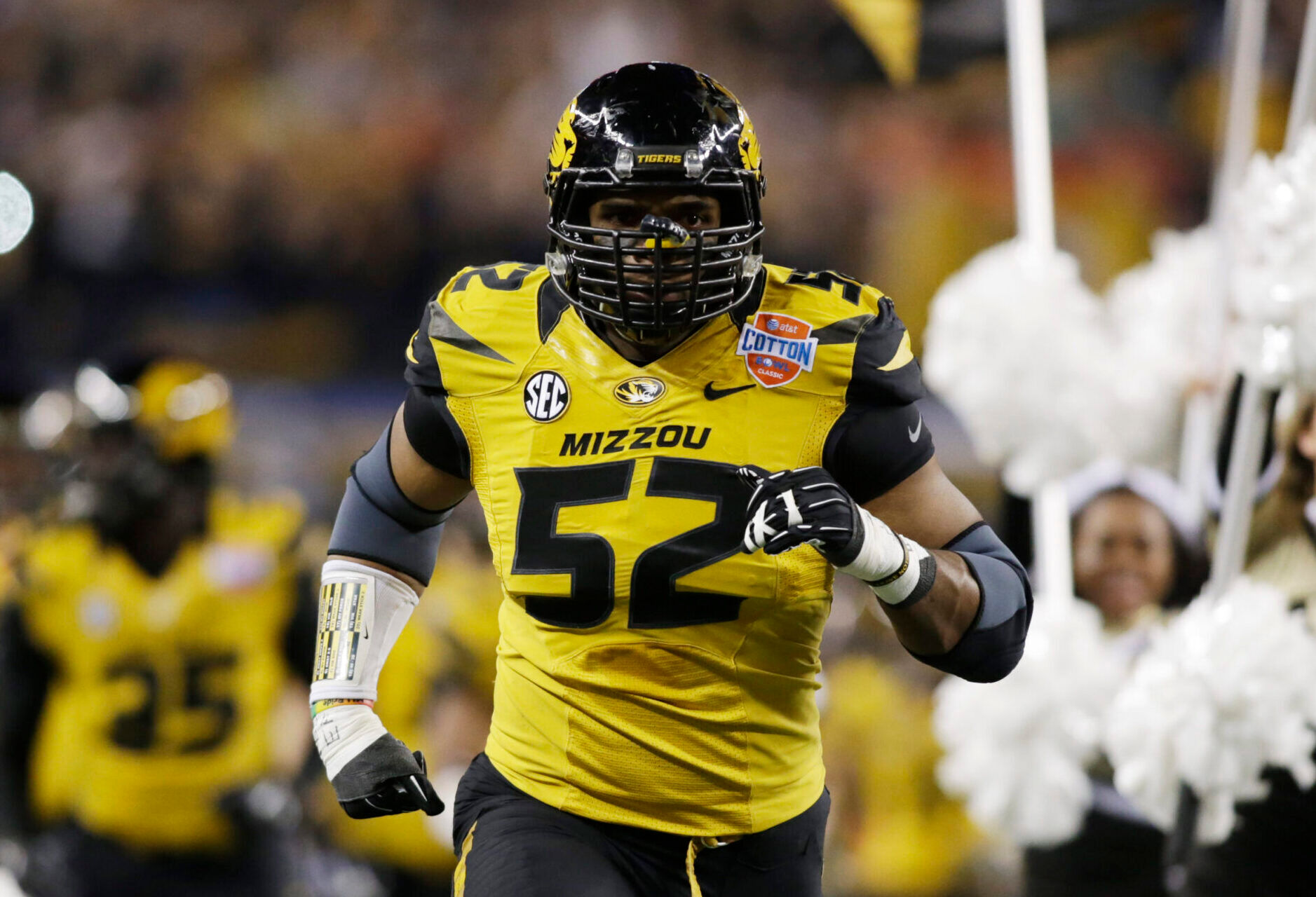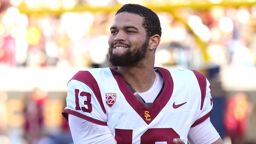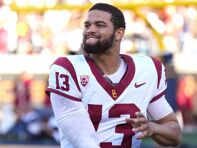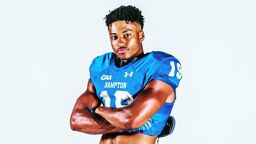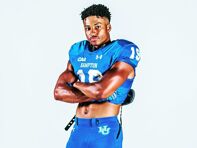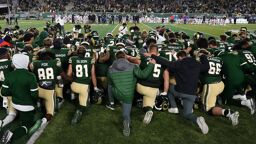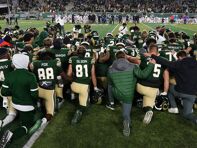It was the afternoon of Jan. 20 that publicist Howard Bragman sent the text:
“The eagle has landed.”
I knew right away what he meant.
He had just come from lunch with NFL agents Joe Barkett and Cameron Weiss of Empire Athletes. They were representing an NFL Draft prospect — Missouri defensive end and SEC co-defensive player of the year Michael Sam — who wanted to come out publicly as gay. They were looking for a publicist to roll out the story and Howard Bragman’s name kept popping up over and over.
“His philosophy resonated with ours,” Weiss said. “I trust Howard. I’m a pretty good read of character. I got a very trustworthy vibe from him that he wanted to do this the right way and do the right thing. We knew at that lunch, Howard was the guy for this.”
It was only a month earlier that the agents had met Sam. They had been interested in signing him since they happened upon a stellar performance “by No. 52” on television more than a year earlier. Doing their research on Sam, they found various rumors on the Internet — largely buried in discussion boards — of him being gay.
Sam had in fact told his team at the University of Missouri that he was gay last summer. It was prompted by a simple team-building exercise with a question from a coach: “Tell us something we don’t know about you.” Some of the team had already known. Some were shocked by the news. All of them embraced him. None of them told the media.
Sam played the entire 2013 season, leading the SEC in sacks and leading his team to a win in the Cotton Bowl, as a gay man out to his team and coaching staff.
Leaving his first meeting with Sam at the University of Missouri in mid-December, Barkett whipped out his phone to call his partner Weiss with the big news. While Barkett never discussed sexual orientation with Sam at their first meeting, he thought he had figured it out:
“There’s no way this guy’s gay.”
A few weeks later they got the call from Sam: He was going with another agency. It was a big disappointment. Empire Athletes is a small operation representing largely players struggling to make an NFL practice squad. Signing Sam would have represented the biggest development in the company’s fledgling history.
Three days later, on Jan. 10, they got another very unexpected call from Sam: He already felt like he made a mistake and wanted to switch agencies. Holding him back was the pink elephant in the room.
“Tell me something personal about me,” Sam said to Barkett and Weiss on that phone call.
Barkett ran through a couple quick hits about his family, his personal life, things he’d learned on his visit to Missouri.
“No no. See, the reason I didn’t sign with you in the first place is because we didn’t talk about something while you were here, and I didn’t know how you’d feel about it. I’m gay.”
Sam said he wanted to come out publicly; They supported the choice. They would do this together.
The duo assured him they were on board, sharing experiences with gay family members and friends. Sam said he wanted to come out publicly; They supported the choice. They would do this together.
When Bragman called me after meeting the agents three weeks ago, he was looking for a sounding board. We had collaborated on the comings out of former NBA player John Amaechi and former college kicker Alan Gendreau.
Right away, there were two big issues on which he wanted to bounce ideas.
The first order of business was the timing. The agents and Sam wanted to do it in late March after Missouri’s Pro Day. I didn’t like it. The key was to give NFL teams as much time as possible to absorb this: The further ahead of the Draft, the less it would matter in the draft. Plus, it would be important for him to get on the field after he came out. If he wasn’t going to come out before the Combine, I told Bragman he should do it before his Pro Day and plan on participating — He needed to get on the field for scouts after he came out. My suggestion was Wednesday, Feb. 26, the day after the Combine ended. Howard agreed.
The second order of business was to determine where to break the story. Bragman knew the importance of this decision. For him, there was one determining factor: Who had earned it?
Howard already knew he wanted the TV element to be on ESPN. He has a working relationship with ABC, who shares a parent company — Disney — with ESPN. He had worked with Chris Connelly before and respected his work, and he knew ESPN would treat Sam well. Plus, ESPN is a sports media outlet with a good track record on LGBT sports issues: The story had to be the football, the sport.
Bragman also wanted to include Outsports in the plan. He knew we would be talking “20 times a day” as this unfolded, and he wanted to give Outsports the “behind the scenes” story, the insight into how the story came about. No one else in the media would have been in the middle of strategy conversations, and it was a story Bragman felt needed to be told.
“Outsports has been light years ahead of any other publication on this topic,” he said. “And I think Outsports has earned it.”
The last piece — print media — was the big question. We talked about USA Today and Time magazine. The cover of Time would be huge. Jason Collins had come out in Sports Illustrated, but Bragman wanted to go a different direction.
“What about Bob Lipsyte?” Howard asked. “He’s the best.”
The problem was, Lipsyte — former writer for The New York Times — is now the ombudsperson at ESPN. Bragman thought about asking him to write the story for ESPN The Magazine but quickly squashed that — He didn’t want one company controlling the TV and print. This was going to be a team effort: No one place would “own” the story. Bragman quickly settled on The New York Times and writer John Branch, who had written several well-received articles about LGBT athletes.
The decision of where to go and whom to include wasn’t arrived at lightly. Bragman knows well from experience that when you include certain media outlets, you simultaneously exclude others.
Get off the sidelines and into the game
Our weekly playbook is packed with everything from locker room chatter to pressing LGBTQ sports issues.
“Part of the strategy is to announce it once and let Michael focus on his football.”
“I know a lot of people will be pissed,” Bragman said. “There are a lot of friends in the media who won’t be happy because they didn’t get the story. And there will be lots of people trying to explain to me that we need to do the cover of their magazine. Part of the strategy is to announce it once, announce it well and let Michael focus on his football.”
Bragman realized some LGBT activists would also be unhappy. While other athletes like Jason Collins and Robbie Rogers have been readily available to lend their voices to various LGBT organizations, that won’t happen with Sam. He’s at the beginning of his career, not the middle or end like Rogers and Collins. Trying to get drafted, make a roster and step foot on an NFL field in September is a big task. His role in the movement toward LGBT equality in sports will be simply playing the sport as an out gay man — a role many have been waiting years for someone to step into. Bragman reached out to various organizations to make that message clear. They all agreed.
“Michael is a football player, not an activist,” Bragman said. “If you start showing up at too many dinners and too many parades, you start to send the message to a potential team about his priorities. The community wins when he steps onto an NFL field and plays in a game, not as the grand marshal of a pride parade. He may do that eventually, but the first year needs to be all about football.”
The plan was set. The story would break right after the NFL Combine simultaneously on ESPN, The New York Times and Outsports. There might be a couple interviews after that, but otherwise Sam would focus on football.
The timing, however, would quickly change. Even as the plan was being formulated, it was like outrunning an avalanche. Every day it became more apparent that too many people knew what was coming. While Collins had kept his coming out a secret held among just a few trusted confidants, Sam’s sexual orientation would soon become the worst-kept secret in the sports media.
Because he was out to his team at Missouri, many in the local media there knew Sam was gay. Barkett and Weiss had taken a few meetings with folks and called some people they trusted — including former NFL player Brendon Ayanbadejo — to get some much-needed advice. If Ayanbadejo knew, that meant Fox Sports knew (he is a contributor there).
It wasn’t until speaking to Wade Davis on Jan. 23 that my recommendation to Howard changed. Davis, a former NFL player who is gay, and I were in Chicago for a meeting of the LGBT Sports Coalition with Nike. Wade had heard about Sam from Troy Vincent at the NFL. Suddenly the NFL and a top-notch LGBT sports advocacy group knew about the impending news.
The decision to speed up the process was cemented at the January Senior Bowl in Mobile, Ala. Weiss and Barkett were a hot ticket in Mobile that week as scouts were eager to see how Sam would perform at outside linebacker. He played defensive end at Missouri, but teams with a 3-4 defense wanted to see how he would translate for them. It was a key storyline to the game.
While scouts were interested in his on-field performance, they seemed equally interested in asking Weiss and Barkett about their client’s personal life.
“At the Senior Bowl, it was the first question I got from the scouts almost every time,” Barkett said. He didn’t feel there was an agenda behind the question other than trying to determine if the word on the Internet was true. “They would ask about spending time with him, were there girls around? Who is his girlfriend? They didn’t ask that about another client, Tom Hornsey. They only asked it about Michael.”
A sooner coming-out date had to be after the Super Bowl. Despite the Olympics starting Feb. 7, the announcement had to be early in the week of Feb. 10. While the Olympics would be taking up some space, everyone knew the story of the first soon-to-be NFL player to come out publicly would muscle its way through the Olympic headlines.
“Too many calls and too many journalists were sniffing around.”
“What really became clear was that it wasn’t going to hold until the Combine,” Bragman said. “Too many calls and too many journalists were sniffing around. So we decided to give the Super Bowl its chance to breathe, and we’d come in with a sneak announcement on Monday, Feb. 10.”
Waiting even that long — two weeks — was a risk, but it was a risk that had to be taken. The story had the potential to be the biggest sports story of the year. This wasn’t an active player on the Denver Broncos coming out that affected one team — this was a player who could be drafted by any of the 32 teams. It affected the entire nation, every locker room, every front office, every sports talk show, every sports blog. It would also be a story that resonated throughout the year: later this month at the Combine, next month at Missouri’s Pro Day, in May at the NFL Draft, then again this summer at OTAs, training camp and in September when the NFL season starts. The story would be a marathon, but the timing of the first step was crucial.
Despite the sudden urgency, there had to be some ground-laying. Part of that would be media training for Sam. He’s a gregarious guy, used to the spotlight playing four years in the SEC, which some consider the closest thing in the world to playing in the NFL.
Yet he’s never had to talk publicly about being gay or answer a reporter’s questions about it. Issues about the showers — most recently raised by New Orleans Saints linebacker Jonathan Vilma — can be sensitive.
Saturday afternoon, I sat with Sam and grilled him in a practice interview at Bragman’s house. The next day he would be sitting down with ESPN and The New York Times. Bragman, Weiss and Barkett were the audience, critiquing Sam on his answers. When the topic was football he knew what to say, sharing playing experiences and his love of defense (he’d rather be the one hitting than being hit). When asked about his childhood, he opened up sharing intimate details about enduring abuse from his brothers, experiencing the pain of losing three siblings, and finding solace in football. He is the first person in his family to graduate from college. When questions turned to gay issues in that mock interview, Sam worked through the answers.
Saturday night, Bragman held a coming out party for Sam at his home in Los Angeles. It was a powerful collection of guests. Dave Kopay, the gay former NFL running back who blazed a trail when he came out publicly in 1975, was in high spirits. Former NFL players Chris Kluwe, Brendon Ayanbedajo and Wade Davis, plus former Major Leaguer Billy Bean — the former San Diego Padre who came out over a decade ago — had come to lend their support. Outsports’ Jim Buzinski and I were also in attendance.
 From left to right: Wade Davis, Dave Kopay, Michael Sam, Chris Kluwe, Billy Bean, Brendon Anyanbadejo. (Photo by Cyd Zeigler)
From left to right: Wade Davis, Dave Kopay, Michael Sam, Chris Kluwe, Billy Bean, Brendon Anyanbadejo. (Photo by Cyd Zeigler) It was a rare collection of gay people and straight supporters from the sports world that had been assembled for some Chinese food and good wine on Saturday night. Kopay shared stories about Pro Bowler Jerry Smith. Kluwe waxed poetic about our broken governmental system. Davis wore his signature bright sneakers that were a hot topic of conversation.
“The man of the hour,” as Bragman called him, was Sam. His coming out party was the calm before the storm: About a dozen folks gathered in Bragman’s kitchen sharing stories and laughing. It was moving to watch Kopay — the first former NFL player to ever come out publicly — talk with Sam, who in all likelihood will be the first NFL player to be out while active almost 40 years after Kopay’s own historic revelation.
Nearly void from the conversation was any hint of concern. It was refreshing for Barkett and Weiss to see the support. They had been second-guessed by a lot of people who still believe it’s nearly impossible to be gay in the NFL.
“We’ve had a lot of people tell us not to do this,” Barkett said. “Friends, prominent business people. But it’s something Cameron and I were asked to help with. And to say no to someone regardless of what the situation is, that’s not in our personal beliefs. Mike entrusted us with this, and we want to make sure it’s done right for Mike and the gay community as a whole.”
The new team Sam is building around him isn’t afraid. Sam isn’t afraid. Saturday night he exuded complete confidence, joking with his big smile and bigger laugh that can fill a room.
“You all are the ones who are nervous,” Sam said. “I’m excited.”
It’s easy to understand why. His teammates knew he was gay and none of them cared about showering with him for an entire season. It also didn’t hurt the team’s success as Missouri finished 12-2 and ranked No. 5 in the country. Sam and his agents know the fears some have tried to put in them are based on simply the fear of the unknown.
“From a few personal friends who work for NFL teams, it seemed like they said an announcement like this might make him slip a little bit,” Weiss said. “Some people think it would be a huge problem, some people think it will be a nonissue, some people will draft the best person at the position, some people think his draft stock will drop. But since teams are kind of in-the-know already, we think it would be best for Mike to be honest and up front with them.”
Last Friday, the best-laid plan began to unravel. Again, too many people knew. Bragman got a call from the Columbia Missourian, the daily paper published by the University of Missouri’s School of Journalism. They knew the story would be breaking soon, and they wanted to talk to Sam. Since Sam was out to his team in college and people on campus knew, it wasn’t a big surprise.
Then came the call from Jon Wertheim. Sports Illustrated knew everything and they wanted to break the story. Wertheim graciously played ball and agreed to not jump the gun. Following that was news of various interview requests disseminating around the world from CNN, BuzzFeed, Fox Sports, even a reporter from the Dutch version of NPR. Late Saturday night, it was clear that Bleacher Report was aware of the story as well.
While it was a decent chance before Saturday that the story would get leaked publicly, there was suddenly zero percent chance the story would hold until Monday afternoon. Someone would break the news early even if they didn’t have the story. The only thing I felt holding back other media outlets was the firestorm of venom thrown at ESPN and Grantland three weeks earlier for outing a trans woman. If it hadn’t been for the reaction to that story, someone would have already jumped the gun.
For Sam and his team, the most important element to the entire process has been protecting Sam’s ability to tell his story himself first. It was that core tenet that dictated the decisions of where, when and how to break the story: Sam, not a reporter looking for some pageviews, had to tell his story on his terms.
It was with that in mind that the team moved up the release to Sunday night. Watching the reaction in the coming days will undoubtedly be overwhelming — And it will be overwhelmingly positive. Not only has the sports world changed dramatically on this issue, witnessed by Sam’s own experiences at Missouri, but Sam himself — A projected high NFL draft pick and SEC leader in sacks — is the perfect man to be the first.
“If we were choosing someone to be the first, we’d choose someone like Michael,” Bragman said. “Smart, athletic, handsome. I don’t think Central Casting could have come up with someone better.”
* * *
A Michael Sam scouting report
“I think Michael Sam has upped his game from what he’s done in the past and I think it’s been a big contagious. I think he’s kind of raised the bar for high, high-level effort and technique every play.” — Gary Pinkel
“Before we go out there for a series, he’ll grab me by my facemask, look into my eyes and say, ‘I need you this series. I need you to be with me.’ And that just gets me all fired up and ready to go.” — Missouri DT Lucas Vincent
When Michael Sam was named a unanimous All-American in December, it was difficult to find an article about him that didn’t reference his leadership ability, his high motor, and his value as a teammate. Those traits helped to convert him from a 2-star recruiting prospect to an All-American, and it was a big reason why Missouri flipped from 5-7 to 12-2 in 2013. He wasn’t even Missouri’s best defensive end for large portions of the season — junior (and potential first-round pick) Kony Ealy dominated in November, and junior Markus Golden made as many or more big plays per snap — but he set the tone for the entire defense.
Missouri fans heard about Sam’s motor from day one, and they caught glimpses of it throughout his four seasons in black and gold. He got a little bigger and a little faster each year, and by the time his senior season rolled around, he had grown enough to become a destructive force in college football’s best conference.
Sam’s pro prospects are difficult to figure out. He is not big enough to fulfill the prototype of a 4-3 defensive end in the NFL, and as he showed in Senior Bowl practices, he isn’t agile (or experienced) enough in space to make an immediate impact as a 3-4 outside linebacker. He could get stuck as a ‘tweener, a player without a true position, something that has afflicted many great college players in the pros. But he can rush the passer, and his motor, his passion for football, and his willingness to learn and work will give him a fighting chance.
